
Diversity-Basel
Scope & Guideline
Shaping the future of biodiversity conservation through cutting-edge research.
Introduction
Aims and Scopes
- Biodiversity Assessment:
Research on species diversity, distribution patterns, and community structure across different ecosystems, including aquatic, terrestrial, and subterranean environments. - Conservation Biology:
Focus on strategies for the conservation of threatened species and ecosystems, including genetic assessments, habitat suitability modeling, and the evaluation of conservation policies. - Ecological Interactions:
Studies examining the interactions between species within ecosystems, including predator-prey dynamics, mutualisms, and the effects of invasive species. - Molecular Phylogenetics:
Utilization of molecular techniques such as DNA barcoding and phylogenetic analysis to explore genetic diversity, species delimitation, and evolutionary relationships among taxa. - Impact of Climate Change:
Research on how climate change affects biodiversity, species distribution, and ecosystem functioning, including assessments of adaptive traits and responses to environmental stressors. - Human-Wildlife Interactions:
Investigations into the effects of human activities on wildlife, including habitat fragmentation, road mortality, and community perceptions towards conservation.
Trending and Emerging
- eDNA Metabarcoding:
The use of environmental DNA (eDNA) metabarcoding has surged, allowing for efficient monitoring of biodiversity and assessment of community structure across various ecosystems. - Climate Change Research:
There is an increasing focus on understanding the impacts of climate change on biodiversity, including species distribution models and adaptive responses of flora and fauna. - Conservation Genomics:
Emerging research in conservation genomics is gaining traction, with studies investigating the genetic diversity and population structure of endangered species to inform management practices. - Human Dimensions of Conservation:
A growing emphasis on the social aspects of conservation, including community engagement and the socio-economic factors influencing biodiversity preservation, reflects a trend towards integrating human perspectives into biodiversity research. - Functional Diversity Studies:
Research exploring functional diversity and its relationship to ecosystem services and resilience is trending, emphasizing the role of species traits in ecological interactions and community stability.
Declining or Waning
- Traditional Taxonomy:
There has been a noticeable decrease in papers solely focused on traditional taxonomic classifications without integrating molecular techniques, as the field increasingly emphasizes phylogenetic and genetic approaches. - Invasive Species Studies:
Research specifically centered on invasive species impacts has waned, potentially due to a shift towards broader ecological interactions and conservation strategies that encompass invasive species as part of a larger ecological context. - Local Biodiversity Hotspots:
The emphasis on documenting local biodiversity hotspots, particularly in well-studied regions, has decreased as the journal shifts towards global assessments and integrative conservation strategies.
Similar Journals

PHYTOCOENOLOGIA
Championing Innovation in Plant EcologyPHYTOCOENOLOGIA, published by GEBRUDER BORNTRAEGER, is a prominent journal in the field of Plant Science, holding a prestigious position in the academic landscape with a 2023 Scopus rank of #235 out of 516 in its category, reflecting its contributions to agricultural and biological sciences. Since its inception in 1987, the journal has provided a vital platform for researchers, offering insights and disseminating advances in phytoecology and related disciplines. With its strong commitment to quality, PHYTOCOENOLOGIA is classified in the Q3 quartile, making it a valuable resource for professionals and students alike. The journal welcomes diverse research articles, reviews, and case studies that enhance our understanding of plant communities and their ecological dynamics. Although it operates under a traditional access model, it continues to foster a collaborative environment for scholars eager to explore critical issues in plant science.
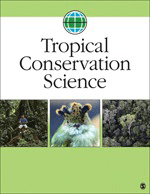
Tropical Conservation Science
Empowering research to protect tropical biodiversity.Tropical Conservation Science, an esteemed journal published by SAGE Publications Inc, plays a pivotal role in the field of environmental science, particularly within the realms of ecology and nature conservation. Established as an Open Access platform since 2008, it facilitates global dissemination of critical research findings dedicated to the preservation of tropical ecosystems. With an impressive impact factor reflected in its Q2 rankings within both ecology and nature landscape conservation categories for 2023, the journal is ranked in the 66th percentile for Environmental Science and maintains a strong position in the academic community. The journal’s scope encompasses a wide array of tropical conservation issues and aims to foster interdisciplinary collaboration among researchers, professionals, and students committed to advancing conservation strategies. Tropical Conservation Science is not merely a publication; it's a vital resource contributing to the safeguarding of our planet's biodiversity.

ECOGRAPHY
Empowering Conservation Through Open Access KnowledgeECOGRAPHY, published by WILEY, stands at the forefront of ecological and evolutionary research, with an impressive Impact Factor reflecting its esteemed position in the Q1 category of Ecology, Evolution, Behavior, and Systematics. Operating since 1978 and transitioning to a fully Open Access model in 2020, the journal is dedicated to disseminating high-quality research that influences conservation practices and enhances our understanding of ecological dynamics. With an ISSN of 0906-7590 and an E-ISSN of 1600-0587, ECOGRAPHY has garnered a remarkable placement in Scopus rankings, being in the top 4% of its category, achieving an impressive rank of #27 out of 721 in Agricultural and Biological Sciences. Academics from around the globe benefit from the research published in this journal, which seeks to engage and inspire further exploration of ecological systems. For inquiries, ECOGRAPHY can be reached at their UK address: 111 River St, Hoboken 07030-5774, NJ.
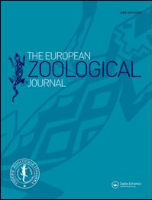
European Zoological Journal
Bridging the Gap Between Research and Ecological SolutionsEuropean Zoological Journal, published by Taylor & Francis Ltd, is an esteemed open-access publication dedicated to advancing the exciting field of zoology. Since its inception in 2017, this journal has progressively established itself as a vital resource for researchers, professionals, and students alike. With its Q2 ranking in Animal Science and Zoology as of 2023, the journal ranks in the 69th percentile among its peers, showcasing its influence and contribution to the discipline. The journal’s broad scope covers a wide range of topics within zoology, aiming to foster an understanding of animal biology and conservation efforts. As an open-access journal, it not only enhances the dissemination of knowledge but also encourages collaborative research across global communities. Situated in the United Kingdom, the European Zoological Journal invites submissions that contribute to the evolving discourse in animal sciences, and endeavors to support the scientific community in addressing pressing ecological challenges.
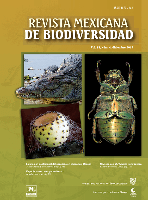
Revista Mexicana de Biodiversidad
Illuminating the Path to Biodiversity PreservationRevista Mexicana de Biodiversidad is a prominent academic journal dedicated to the field of biodiversity and conservation, published by the prestigious Instituto de Biología, Universidad Nacional Autónoma de México. Since its inception as an Open Access publication in 2005, it has aimed to disseminate high-quality research that advances the understanding of biological diversity in Mexico and beyond. With an ISSN of 1870-3453 and an E-ISSN of 2007-8706, the journal caters to a diverse audience, including researchers, professionals, and students, by providing vital insights into ecological studies, conservation strategies, and the sustainable management of natural resources. The journal is committed to fostering scientific collaboration and promoting the significance of biodiversity in addressing contemporary environmental challenges. By publishing innovative and impactful research, the Revista Mexicana de Biodiversidad plays an essential role in the global discourse on biodiversity conservation.
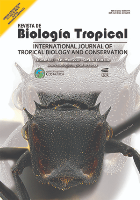
REVISTA DE BIOLOGIA TROPICAL
Unveiling the secrets of tropical biodiversity.REVISTA DE BIOLOGIA TROPICAL is a prominent scholarly journal published by the Universidad de Costa Rica that serves as a vital platform for research in the realms of agricultural and biological sciences. Established in 1969, the journal has evolved into a crucial resource, contributing significantly to the understanding of tropical ecosystems and biodiversity. With its current classification in the Q2 quartile for Agricultural and Biological Sciences, it ranks #109 out of 221 journals in its category, reflecting its esteemed position within the academic community. Although it operates under traditional access guidelines, the journal remains committed to disseminating high-quality research that informs conservation efforts and sustainable practices in tropical biology. The journal's diverse scope encompasses a wide range of topics, ensuring relevance for professionals, researchers, and students dedicated to enhancing knowledge and innovation in the biological sciences. As the journal progresses towards 2024, it continues to invite contributions that advance scientific discourse and foster collaboration within the field.

ANIMAL BIODIVERSITY AND CONSERVATION
Innovating conservation strategies for a diverse world.ANIMAL BIODIVERSITY AND CONSERVATION is a distinguished open-access journal dedicated to advancing the knowledge of animal biodiversity and conservation practices. Published by the esteemed MUSEU DE CIENCIES NATURALS-ZOOLOGIA in Spain, it provides a platform for researchers and professionals in the fields of Animal Science and Nature Conservation. With its ISSN of 1578-665X and E-ISSN 2014-928X, the journal has been committed to open access publication since 2001, ensuring that valuable research is easily accessible to a global audience. As of 2023, it holds an impressive Q2 ranking in both Animal Science and Zoology and Nature and Landscape Conservation, reflecting its impact and relevance in the scholarly community. The journal covers a broad scope of topics, contributing vital insights and fostering discussions that support the conservation of biodiversity. With key Scopus rankings revealing its standing among the top journals in its field, ANIMAL BIODIVERSITY AND CONSERVATION continues to be an essential resource for researchers, conservationists, and students dedicated to understanding and preserving the rich tapestry of life on our planet.

Journal of Asia-Pacific Biodiversity
Empowering science to protect our vital ecosystems.Journal of Asia-Pacific Biodiversity is an esteemed academic journal dedicated to advancing knowledge in the dynamic fields of biodiversity, ecology, and related biological sciences. Published by the NATL SCIENCE MUSEUM & KOREAN NATL ARBORETUM, this journal serves as a crucial platform for researchers and professionals seeking to explore and disseminate impactful findings pertaining to the Asia-Pacific region's rich biological diversity. With an E-ISSN of 2287-9544, the journal is indexed in leading databases, achieving a Q3 ranking across various categories in 2023, including Animal Science and Zoology, Ecology, Insect Science, and Plant Science. It strives to unite scientific research across disciplines, thus fostering a deeper understanding of ecological dynamics and conservation efforts within this vital region. The journal operates with an open access policy, ensuring that findings are widely available for widespread benefit, making it an essential resource for students, researchers, and environmental practitioners alike. Since its initiation in 2013 and continuing through 2024, the journal remains committed to delivering high-quality, peer-reviewed articles that contribute significantly to the global conversation on biodiversity and ecosystem sustainability.

Nature Conservation Research
Driving impactful research for ecological resilience.Nature Conservation Research is a prominent open-access journal that has been dedicated to advancing the field of conservation science since its inception in 2016. Published by the SARANSK FOND PODDERZKI & RAZVITIA ZAPOVEDNYH in the Russian Federation, this journal serves as a vital platform for researchers, professionals, and students alike, providing critical insights into ecological and environmental issues. With an impressive impact factor and ranked in the second quartile across multiple categories—including Agricultural and Biological Sciences, Earth and Planetary Sciences, Ecology, and Nature and Landscape Conservation—Nature Conservation Research stands at the forefront of impactful scientific discourse. The journal not only aims to disseminate high-quality research findings but also seeks to foster collaboration and innovation in conservation practices globally. By ensuring open access to its content, it promotes widespread dissemination of knowledge, crucial in the fight against biodiversity loss and environmental degradation. Researchers and practitioners contributing to the journal will find themselves at the convergence of science and conservation efforts, paving the way for sustainable ecosystem management.
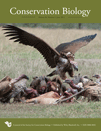
CONSERVATION BIOLOGY
Leading the way in conservation science and practice.CONSERVATION BIOLOGY, published by Wiley, is a leading journal in the field of ecology and conservation, with a focus on disseminating high-quality research that addresses pressing environmental challenges. With a strong impact factor and categorized in the top quartile (Q1) across various relevant fields including Ecology, Evolution, Behavior and Systematics, and Nature and Landscape Conservation, the journal plays a pivotal role in advancing the scientific understanding of biodiversity and conservation practices. Since its establishment in 1987, CONSERVATION BIOLOGY has provided a vital platform for researchers, professionals, and students to share innovative findings and facilitate discussions surrounding ecological sustainability and conservation strategies. Although it is not an open-access publication, it ensures that a wide range of significant research is accessible to the global scientific community. The journal’s rigorous peer-review process and reputation for excellence make it an essential resource for anyone involved in the study of ecology and conservation.